He's too self absorbed to listen.
Majority of Canadians want carbon tax dropped or waived for three years - poll — Reuters
A majority of Canadians want Prime Minister Justin Trudeau's signature carbon tax to be scrapped or waived for the next three years to make the levy consistent across the country, an opinion poll released on Thursday showed.apple.news
April Fools!! Here's your Carbon Tax F#ckers!!!
- Thread starter Ron in Regina
- Start date
You are using an out of date browser. It may not display this or other websites correctly.
You should upgrade or use an alternative browser.
You should upgrade or use an alternative browser.
It's s slush fund to support lesbian welders who build pipelines in Botswana.He's too self absorbed to listen.
The Saskatchewan Party government announced last month that SaskEnergy would stop remitting the carbon tax on natural gas on Jan. 1 in response to Ottawa's decision to pause the charge on home heating oil.
The federal move largely helps those in Atlantic provinces, where it's a main source for home heating, and Saskatchewan and other provinces have said it's unfair natural gas hasn't been treated similarly.
The bill introduced in the legislature on Thursday would designate the province as the sole registered distributor of natural gas in Saskatchewan.
It says the province would protect the Crown corporation, all of its current and former directors, officers, employees and other associates from legal consequences of not remitting the tax.
Federal law says corporations that fail to remit the charge could face steep fines, and its executives could also get jail time.
“I think what we’ve tried to do is provide as much assurance as we can,” Dustin Duncan, the minister responsible for SaskEnergy, said about the bill.
“This will be the government that will be making the decision in the event that we get to the point of not remitting the carbon tax.”

 apple.news
Dustin Duncan, the minister responsible for SaskEnergy, previously said he’s willing to go to “carbon jail” for not remitting the tax. The province would be responsible for paying fines, he added.
apple.news
Dustin Duncan, the minister responsible for SaskEnergy, previously said he’s willing to go to “carbon jail” for not remitting the tax. The province would be responsible for paying fines, he added.

 www.cjme.com
Katherine Cuplinskas, a spokesperson for the federal Finance Department, said in an email Canadians expect everyone to obey The Law of Liberal-Land, adding the price on pollution framework was upheld by the Supreme Court of Canada.
www.cjme.com
Katherine Cuplinskas, a spokesperson for the federal Finance Department, said in an email Canadians expect everyone to obey The Law of Liberal-Land, adding the price on pollution framework was upheld by the Supreme Court of Canada.
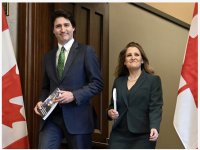
Prime Minister Justin Trudeau said in late October that Ottawa won't offer further exemptions (like the one offered to the Previously Liberal vote heavy Maritimes) as heating oil is far more expensive than natural gas and those who use it don't have other options readily available….like the plethora of choices like Nuclear or Hydro or tide generated energy out on the prairies?? Perhaps some Heat-Pumps that will probably work most of the time in Vancouver or Toronto?

Perhaps the Current Ottawa Clown Show will agree to review their decision sometime in 2026-27???
The federal move largely helps those in Atlantic provinces, where it's a main source for home heating, and Saskatchewan and other provinces have said it's unfair natural gas hasn't been treated similarly.
The bill introduced in the legislature on Thursday would designate the province as the sole registered distributor of natural gas in Saskatchewan.
It says the province would protect the Crown corporation, all of its current and former directors, officers, employees and other associates from legal consequences of not remitting the tax.
Federal law says corporations that fail to remit the charge could face steep fines, and its executives could also get jail time.
“I think what we’ve tried to do is provide as much assurance as we can,” Dustin Duncan, the minister responsible for SaskEnergy, said about the bill.
“This will be the government that will be making the decision in the event that we get to the point of not remitting the carbon tax.”
Saskatchewan introduces bill on withholding carbon tax on natural gas — The Canadian Press
REGINA - The Saskatchewan government has introduced legislation that it says would enable it to stop remitting the federal carbon tax on natural gas bills while providing legal protection for those at its energy Crown corporation.

‘This is about fairness’: Crowns minister explains new SaskEnergy carbon tax fight
Crowns Minister Dustin Duncan discussed the province's new carbon tax fight with the feds.
 www.cjme.com
www.cjme.com

Prime Minister Justin Trudeau said in late October that Ottawa won't offer further exemptions (like the one offered to the Previously Liberal vote heavy Maritimes) as heating oil is far more expensive than natural gas and those who use it don't have other options readily available….like the plethora of choices like Nuclear or Hydro or tide generated energy out on the prairies?? Perhaps some Heat-Pumps that will probably work most of the time in Vancouver or Toronto?

Perhaps the Current Ottawa Clown Show will agree to review their decision sometime in 2026-27???
Alberta Premier Danielle Smith will be using the province’s Sovereignty Act to challenge Ottawa’s requirement to achieve a net-zero electricity grid by 2035.

 calgarysun.com
Premier Smith said the province tried to work collaboratively with the federal government to make the province’s electricity grid net zero by 2050.
calgarysun.com
Premier Smith said the province tried to work collaboratively with the federal government to make the province’s electricity grid net zero by 2050.
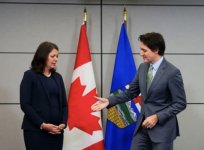 However, Ottawa’s target of 2035 is “unachievable” and will make electricity unaffordable for Albertans, she said.
However, Ottawa’s target of 2035 is “unachievable” and will make electricity unaffordable for Albertans, she said.

 calgary.citynews.ca
“We will not put our operators at risk of going to jail if they do not achieve the unachievable,” she said. “We have to have an affordable grid, and we’re going to make sure that we defend our constitutional jurisdiction to do that.”
calgary.citynews.ca
“We will not put our operators at risk of going to jail if they do not achieve the unachievable,” she said. “We have to have an affordable grid, and we’re going to make sure that we defend our constitutional jurisdiction to do that.”

 edmontonjournal.com
Smith added that the Clean Energy Regulations disregard Section 92 of the Constitution Act, which says provincial matters fall under provincial jurisdiction.
edmontonjournal.com
Smith added that the Clean Energy Regulations disregard Section 92 of the Constitution Act, which says provincial matters fall under provincial jurisdiction.
“I don’t want to do this. I really didn’t. From the very first conversation I had with (Prime Minister) Justin Trudeau, I said I wanted to work with him on this. We put together a table with good negotiators so that we could find areas of common ground.
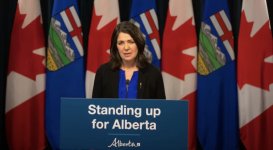 But Steven Guilbeault (federal environment minister)…he’s a maverick. He doesn’t seem to care about the law, doesn’t care about the Constitution. I do. And we’re going to make sure that we assert that,” she said.
But Steven Guilbeault (federal environment minister)…he’s a maverick. He doesn’t seem to care about the law, doesn’t care about the Constitution. I do. And we’re going to make sure that we assert that,” she said.

 globalnews.ca
globalnews.ca

 apple.news
apple.news

Bell: Smith to trigger Alberta sovereignty act against Trudeau Monday
Premier Danielle Smith to trigger Alberta Sovereignty within a United Canada Act against Trudeau Monday in fight over electricity rights
 However, Ottawa’s target of 2035 is “unachievable” and will make electricity unaffordable for Albertans, she said.
However, Ottawa’s target of 2035 is “unachievable” and will make electricity unaffordable for Albertans, she said.
Danielle Smith to use Sovereignty Act on CER - CityNews Calgary
Alberta Premier Danielle Smith said on her radio show that she is going to use the Sovereignty Act on Monday against the proposed Clean Energy Regulations.

Premier Danielle Smith says she’ll reveal details on threat to invoke sovereignty act
Smith told her provincewide radio call-in show on Saturday that she's "had it" with federal Environment Minister Steven Guilbeault.
“I don’t want to do this. I really didn’t. From the very first conversation I had with (Prime Minister) Justin Trudeau, I said I wanted to work with him on this. We put together a table with good negotiators so that we could find areas of common ground.
 But Steven Guilbeault (federal environment minister)…he’s a maverick. He doesn’t seem to care about the law, doesn’t care about the Constitution. I do. And we’re going to make sure that we assert that,” she said.
But Steven Guilbeault (federal environment minister)…he’s a maverick. He doesn’t seem to care about the law, doesn’t care about the Constitution. I do. And we’re going to make sure that we assert that,” she said.
Alberta to invoke Sovereignty Act against Ottawa’s Clean Energy Regulations | Globalnews.ca
Alberta Premier Danielle Smith confirmed the her plan to invoke the Sovereignty Act on Your Province Your Premier on Saturday.
Danielle Smith to invoke Sovereignty Act on Ottawa power rules — CBC News
Alberta's premier has repeatedly threatened to use her controversial law to resist federal policy. A special resolution to thwart the proposed clean electricity regulations will be introduced Monday.
Guilbeault Baggins can take hard long suck on my hobbit.
Guilbeault Baggins can take hard long suck on my hobbit.
Explainer: What is Alberta's Sovereignty Act? — Reuters
Alberta's conservative Premier Danielle Smith put the Canadian province's Sovereignty Act into motion on Monday to challenge the federal government's requirement for a net-zero electricity grid by 2035.
There it goes. Alberta’s sovereignty act is out of the gates and running, triggered Monday by a premier vehemently opposed to a set of draft federal net-zero electricity regulations slated to take effect in 2035. And fair enough — Alberta’s emissions are a mere drop in the worldwide bucket, and they’re already trending down. Whipping can only make a province go faster to a point; after that, it will just make said province angry.
There’s plenty of time for a regime change in Ottawa that would unseat the brains who have resorted to kneecapping Canada’s economy for climate reasons. It could very well be that by 2035, none of this is going to matter.

 apple.news
The feds haven’t been doing so well when it comes to colouring inside the jurisdictional lines on the environment, so it makes sense that Alberta isn’t happy about being legally buzzed once again.
apple.news
The feds haven’t been doing so well when it comes to colouring inside the jurisdictional lines on the environment, so it makes sense that Alberta isn’t happy about being legally buzzed once again.
There’s plenty of time for a regime change in Ottawa that would unseat the brains who have resorted to kneecapping Canada’s economy for climate reasons. It could very well be that by 2035, none of this is going to matter.
Jamie Sarkonak: Danielle Smith triggers sovereignty act to fight meddling Liberals — National Post
The ham-fisted approach taken to punish Alberta for climate grievances was bound to meet resistance
Premier Danielle Smith announced her plans Monday to use her province’s sovereignty act to ignore the Liberals’ proposed clean electricity regulations that aim to have a carbon-neutral grid nationally by 2035. Those regulations will require significant changes to the province’s power grid as Alberta currently relies heavily on natural gas generation.
Smith said Monday following Ottawa’s rule would force the province to dramatically increase prices or live with a grid that is inherently unreliable.
“We are going to preserve the integrity of our power grid in whatever way we need to.”

 apple.news
Environment Minister Steven Guilbeault said his government has no plans to challenge Alberta’s use of the sovereignty act, arguing it has little impact on the Liberals’ proposed clean electricity regulations.
apple.news
Environment Minister Steven Guilbeault said his government has no plans to challenge Alberta’s use of the sovereignty act, arguing it has little impact on the Liberals’ proposed clean electricity regulations.
From Premier Danielle Smith, “Look at the heatwave that happened in British Columbia that killed people. When you have plus-30 weather and they can’t turn on air conditioning they can die.
“When you have minus-30 weather and people can’t turn on their furnaces for an extended period of time they can die.
“That’s why it’s life or death. This isn’t a game we’re playing here, not with the kind of weather extremes we have in our province.
“It is our job to make sure we’re protecting the security of our citizens and having reliable energy is absolutely at the base of that. That’s what we’re going to do.
“I’m not going to let the federal government try to tip-toe or stomp on our jurisdiction and stand in the way of that. We’ve got to take care of business here. Taking care of business means building the power we need.”
That means doubling the power grid in Alberta. That means much more natural gas.
That does not mean a net-zero emissions electricity grid by 2035 the way Prime Minister Justin Trudeau and his green guru Steven Guilbeault want it done.

 apple.news
apple.news
Smith said Monday following Ottawa’s rule would force the province to dramatically increase prices or live with a grid that is inherently unreliable.
“We are going to preserve the integrity of our power grid in whatever way we need to.”
Guilbeault says government won't challenge 'symbolic' moves by Alberta on clean electricity rules — National Post
'Premier Smith said herself yesterday that the sovereignty act is a largely symbolic gesture. You don’t take someone to court for something that’s symbolic'
From Premier Danielle Smith, “Look at the heatwave that happened in British Columbia that killed people. When you have plus-30 weather and they can’t turn on air conditioning they can die.
“When you have minus-30 weather and people can’t turn on their furnaces for an extended period of time they can die.
“That’s why it’s life or death. This isn’t a game we’re playing here, not with the kind of weather extremes we have in our province.
“It is our job to make sure we’re protecting the security of our citizens and having reliable energy is absolutely at the base of that. That’s what we’re going to do.
“I’m not going to let the federal government try to tip-toe or stomp on our jurisdiction and stand in the way of that. We’ve got to take care of business here. Taking care of business means building the power we need.”
That means doubling the power grid in Alberta. That means much more natural gas.
That does not mean a net-zero emissions electricity grid by 2035 the way Prime Minister Justin Trudeau and his green guru Steven Guilbeault want it done.
Bell: For Danielle Smith, sovereignty act is a life or death fight — Calgary Sun
Smith says Alberta is going full steam ahead, whether Guilbeault and the rest of the Trudeau government likes it or not
A month after the federal government exempted home heating oil from its punitive carbon tax, another group is demanding a carve-out — and putting the government in a thorny position.
The Chiefs of Ontario and Attawapiskat First Nation have filed a lawsuit against the federal government over what they allege is “discriminatory and anti-reconciliatory application of the Greenhouse Gas and Pollution Act (GGPPA)” to First Nations. Their main arguments resemble those advanced by rural communities, notably a lack of options when it comes to fuel for things like transportation or industry.
The timing couldn’t be worse for the federal government as the Canadian delegation makes its appearance at COP28, the annual global climate conference, unfolding this week in Dubai. The chiefs’ claim is accompanied by an open letter to Prime Minister Justin Trudeau, in which they characterize the fuel charge cost to First Nations citizens as “another cash grab for Canada, removing several million dollars a year from those least responsible for the climate crisis.”

 www.youtube.com
With the heavy emphasis COP28 puts on indigenous rights, Environment Minister Steven Guilbeault is now in the embarrassing position of defending a tax that hurts Indigenous people, while having given non-indigenous Canadians a break on their heating oil — all for political reasons. It also puts the minister in a no-win situation because of his pledge that, “As long as I’m the environment minister, there will be no more exemptions to carbon pricing.”
www.youtube.com
With the heavy emphasis COP28 puts on indigenous rights, Environment Minister Steven Guilbeault is now in the embarrassing position of defending a tax that hurts Indigenous people, while having given non-indigenous Canadians a break on their heating oil — all for political reasons. It also puts the minister in a no-win situation because of his pledge that, “As long as I’m the environment minister, there will be no more exemptions to carbon pricing.”

 apple.news
In other words: If the government doesn’t give First Nations a break, it’s breaking its promise on reconciliation. But if it does give them an exemption, the minister is breaking his promise not to allow additional carve-outs and should resign.
apple.news
In other words: If the government doesn’t give First Nations a break, it’s breaking its promise on reconciliation. But if it does give them an exemption, the minister is breaking his promise not to allow additional carve-outs and should resign.

 apple.news
apple.news
The Chiefs of Ontario and Attawapiskat First Nation have filed a lawsuit against the federal government over what they allege is “discriminatory and anti-reconciliatory application of the Greenhouse Gas and Pollution Act (GGPPA)” to First Nations. Their main arguments resemble those advanced by rural communities, notably a lack of options when it comes to fuel for things like transportation or industry.
The timing couldn’t be worse for the federal government as the Canadian delegation makes its appearance at COP28, the annual global climate conference, unfolding this week in Dubai. The chiefs’ claim is accompanied by an open letter to Prime Minister Justin Trudeau, in which they characterize the fuel charge cost to First Nations citizens as “another cash grab for Canada, removing several million dollars a year from those least responsible for the climate crisis.”

YouTube
Enjoy the videos and music you love, upload original content, and share it all with friends, family, and the world on YouTube.
Consensus between Sask. Party and NDP sends message to Liberals on carbon tax — Leader Post
"If it's fair for one part of the country to not have to pay the carbon tax, then it should be fair for us here in Saskatchewan as well."
Tasha Kheiriddin: First Nations sue over 'discriminatory' carbon tax — will Guilbeault resign? — National Post
Liberals stuck as reconciliation promises conflict with green agenda
BREAKING: Elon Musk's Tesla start deliveries of Cybertruck - here are specs and prices:

Trudeau was asked Thursday what he’ll do when Saskatchewan stops collecting carbon tax on natural gas for home heating.

The cut-off date is Jan. 1. Premier Scott Moe has backed up the boycott with legislation.
“Canada is a country of the rule of law,” Trudeau said, “and we expect all Canadians to follow the law that applies to provinces as much as it applies to individual citizens.”
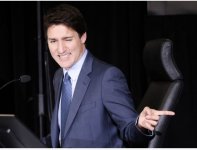
Only last week, Alberta Premier Danielle Smith accused Trudeau of being the only leader to run a “lawless” government.
The word is harsh but there’s truth to the allegation.
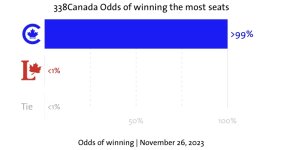
The feds recently lost two major court cases, over the Impact Assessment Act in the Supreme Court, and a Federal Court ruling on single-use plastics.
But they show no willingness to change what they do. The Liberals just talk vaguely about tinkering with the laws. This allows them to carry on as usual while waiting for the provinces to challenge them again.
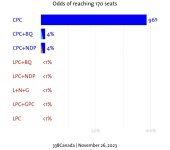
The carbon tax continues to unravel here at home, just as hundreds of Canadians arrive for climate talks in Dubai.
Prime Minister Justin Trudeau isn’t at the COP28 meetings. Maybe that’s wise. No leader wants to miss out on his own coup.
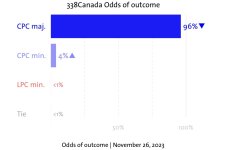
Countrywide, both Conservative and NDP leaders demand carbon tax relief for all forms of home heating, not just heating oil
(The percentage of homes using heating oil in Saskatchewan is 0.3% for perspective).
The governing Liberals refuse. Already deeply unpopular, they’re completely isolated on this pocketbook issue.
All this started when Trudeau lifted the carbon tax from home heating fuel, a move that mainly benefits Atlantic Canada. Liberal MPs and ministers pressured Trudeau personally, and admitted it.
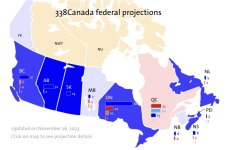

 calgaryherald.com
calgaryherald.com

The cut-off date is Jan. 1. Premier Scott Moe has backed up the boycott with legislation.
“Canada is a country of the rule of law,” Trudeau said, “and we expect all Canadians to follow the law that applies to provinces as much as it applies to individual citizens.”

Only last week, Alberta Premier Danielle Smith accused Trudeau of being the only leader to run a “lawless” government.
The word is harsh but there’s truth to the allegation.

The feds recently lost two major court cases, over the Impact Assessment Act in the Supreme Court, and a Federal Court ruling on single-use plastics.
But they show no willingness to change what they do. The Liberals just talk vaguely about tinkering with the laws. This allows them to carry on as usual while waiting for the provinces to challenge them again.

The carbon tax continues to unravel here at home, just as hundreds of Canadians arrive for climate talks in Dubai.
Prime Minister Justin Trudeau isn’t at the COP28 meetings. Maybe that’s wise. No leader wants to miss out on his own coup.

Countrywide, both Conservative and NDP leaders demand carbon tax relief for all forms of home heating, not just heating oil
(The percentage of homes using heating oil in Saskatchewan is 0.3% for perspective).
The governing Liberals refuse. Already deeply unpopular, they’re completely isolated on this pocketbook issue.
All this started when Trudeau lifted the carbon tax from home heating fuel, a move that mainly benefits Atlantic Canada. Liberal MPs and ministers pressured Trudeau personally, and admitted it.


Braid: Refusal to grant carbon tax relief leaves Trudeau isolated and vulnerable
Trudeau is now completely isolated on carbon tax relief, as he's attacked by NDP, Conservatives and First Nations.
Some Saskatchewan farmers are speaking out against the latest amendment to Bill C-234.
The private member’s bill introduced in the House of Commons was intended to create exemptions for farmers paying the carbon tax for fuel used for things like cooling and heating farms as well as for fuel used for grain dryers.
However, the Senate voted 40-39 on Tuesday night in favour of amending the bill to remove the exemptions for cooling and heating.
Angela Jones, who operates a grain farm near Wadena in northeast Saskatchewan, says Bill C-234 is a pressing issue.
“I think every producer in the province has thoughts on that bill,” Jones said Wednesday at the Agricultural Producers Association of Saskatchewan (APAS) annual general meeting in Regina.
“It’s definitely on top of mind for everybody. It’s in the discussions in the coffee shop (and) it’s in the discussions on the street. It’s just making everything more expensive (and after) a couple years, the producers are feeling the pinch for sure.”
Jones said it’s a huge cause for stress among farmers but she feels their hands are tied.
“So many of the costs we can’t reduce. Farmers are constantly doing what they can to reduce what our costs are,” she said.
”We’ve already taken all the steps we can to reduce the fuel use (and) reduce our inputs and things like that. A lot of the tax that’s getting charged to us is unavoidable.”
Devon Walker, an APAS board member, said farmers don’t have other options to heat barns.
“For us here in Saskatchewan as farmers, I feel like we’ve reduced as much as we can and even after we’ve reduced those energy usages we’re still hit with a tax,” he said.
APAS president Ian Boxall said he was very disappointed in the Senate’s vote.
He said the amendment changes the intent of the bill going forward and fears it won’t get passed in the House.
“My fear is if they take out the heating of barns — which is a huge expense for those producers that are using traditional methods to heat and cool their barns — it will be another hit to the farmers’ bottom line,” Boxall said.
Boxall said the rising costs from the tax will be hard to manage.

 www.cjme.com
www.cjme.com
According to the Conservative senators who rejected the change and have been pushing forcefully to see the bill pass, the amendment has essentially "gutted" the bill and has effectively sent it to die in legislative limbo as it'll have to be referred back to the House.

 apple.news
apple.news
The private member’s bill introduced in the House of Commons was intended to create exemptions for farmers paying the carbon tax for fuel used for things like cooling and heating farms as well as for fuel used for grain dryers.
However, the Senate voted 40-39 on Tuesday night in favour of amending the bill to remove the exemptions for cooling and heating.
Angela Jones, who operates a grain farm near Wadena in northeast Saskatchewan, says Bill C-234 is a pressing issue.
“I think every producer in the province has thoughts on that bill,” Jones said Wednesday at the Agricultural Producers Association of Saskatchewan (APAS) annual general meeting in Regina.
“It’s definitely on top of mind for everybody. It’s in the discussions in the coffee shop (and) it’s in the discussions on the street. It’s just making everything more expensive (and after) a couple years, the producers are feeling the pinch for sure.”
Jones said it’s a huge cause for stress among farmers but she feels their hands are tied.
“So many of the costs we can’t reduce. Farmers are constantly doing what they can to reduce what our costs are,” she said.
”We’ve already taken all the steps we can to reduce the fuel use (and) reduce our inputs and things like that. A lot of the tax that’s getting charged to us is unavoidable.”
Devon Walker, an APAS board member, said farmers don’t have other options to heat barns.
“For us here in Saskatchewan as farmers, I feel like we’ve reduced as much as we can and even after we’ve reduced those energy usages we’re still hit with a tax,” he said.
APAS president Ian Boxall said he was very disappointed in the Senate’s vote.
He said the amendment changes the intent of the bill going forward and fears it won’t get passed in the House.
“My fear is if they take out the heating of barns — which is a huge expense for those producers that are using traditional methods to heat and cool their barns — it will be another hit to the farmers’ bottom line,” Boxall said.
Boxall said the rising costs from the tax will be hard to manage.

‘It adds stress:’ Sask. farmers react to amended carbon tax relief bill
Farmers are concerned about the heating and cooling amendments to Bill C-234.
 www.cjme.com
www.cjme.com
According to the Conservative senators who rejected the change and have been pushing forcefully to see the bill pass, the amendment has essentially "gutted" the bill and has effectively sent it to die in legislative limbo as it'll have to be referred back to the House.
PM pans Poilievre for 'pulling stunts' by threatening to delay MPs' holidays with House tactics — CTV News
Conservative Leader Pierre Poilievre is threatening to delay MPs' holidays by throwing up thousands of procedural motions seeking to block Liberal legislation until Prime Minister Justin Trudeau backs off his carbon tax. It's a move Government House Leader Karina Gould was quick to condemn...
Prime Minister Justin Trudeau said that the Liberals will not abandon their carbon-pricing regime despite procedural protest tactics from the Conservatives that forced MPs to vote non-stop through the night Thursday and into Friday evening.
Conservative Leader Pierre Poilievre and his team said they turned to procedure to challenge the Liberals on carbon pricing. They have also pledged that they will not relent in their pursuit of getting the Liberals to change their position.
Mr. Trudeau, who was in the House of Commons on Friday morning, said “No, we’re not axing the tax” as he left the chamber with a smile.
Earlier this week, Mr. Poilievre delivered a speech to his caucus in which he said his party would put forward thousands of amendments to force all night, round-the-clock voting until the Liberals agreed to their demand “to take the tax off farmers, First Nations and families.”
In an effort to battle rising prices (like from the carbon taxes for example) and failing Liberal support in Atlantic Canada, the federal government is increasing the rebate on carbon pricing for rural Canadians and lifting the carbon price off of home heating oil entirely for the next three years.
The new rules would apply to the Prairie provinces (like the 0.3% of heating oil users in Saskatchewan), Ontario (where this is also a tiny %’age) and Atlantic Canada (where on average heating oil is used in about 33% of homes) to address affordability concerns, but have been largely criticized by climate groups.

 nationalpost.com
Mr. Trudeau said he would increase the carbon price rebate for rural Canadians and pilot a new rebate program in Atlantic Canada that will entirely cover the costs for lower-income households to switch to heat pumps.
nationalpost.com
Mr. Trudeau said he would increase the carbon price rebate for rural Canadians and pilot a new rebate program in Atlantic Canada that will entirely cover the costs for lower-income households to switch to heat pumps.
The government is not making a similar exemption for any other fuels used for heating like they did for heating oil predominantly used in Atlantic Canada, so people who use natural gas to heat their homes will still have to pay the carbon price.
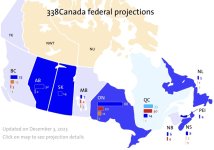
The federal government has since rejected calls for more carbon-pricing concessions, saying its carveout aimed at improving the affordability of home heating oil won’t be extended to households who use other fuels to heat their homes like Natural Gas used predominantly across the nation outside of Atlantic Canada.
 There has been a significant backlash against the carbon tax in Atlantic Canada. Federal carbon pricing took effect on the East Coast in July. Since then, local MPs have received an earful about the higher costs. Opinion polling shows the Conservatives have gained a double-digit lead over the Liberals in the region.
There has been a significant backlash against the carbon tax in Atlantic Canada. Federal carbon pricing took effect on the East Coast in July. Since then, local MPs have received an earful about the higher costs. Opinion polling shows the Conservatives have gained a double-digit lead over the Liberals in the region.
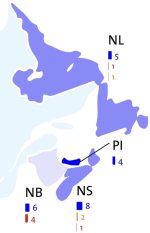

 apple.news
The Trudeau government’s position has been to phase out unabated fossil fuels – meaning the use of oil, natural gas and coal to produce energy where there is no mechanism to reduce the greenhouse gas emissions they produce, such as carbon capture.
apple.news
The Trudeau government’s position has been to phase out unabated fossil fuels – meaning the use of oil, natural gas and coal to produce energy where there is no mechanism to reduce the greenhouse gas emissions they produce, such as carbon capture.
Canada adopted that position in the wake of Prime Minister Justin Trudeau causing a firestorm in 2017 when he said his climate change policies would eventually “phase out” Alberta’s oilsands, which went down about as well as you’d expect in Alberta.
In the face of that, the PM later said he “misspoke” and “said something the way I shouldn’t have said it.”

 apple.news
What the Trudeau government has consistently failed to understand is that Canadians are ready to help lower emissions if they have realistic ways to do so that do not impose unfair economic burdens on them, particularly in the tough economic times and affordability crisis they are currently facing.
apple.news
What the Trudeau government has consistently failed to understand is that Canadians are ready to help lower emissions if they have realistic ways to do so that do not impose unfair economic burdens on them, particularly in the tough economic times and affordability crisis they are currently facing.
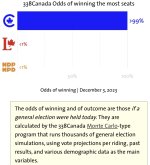
However, they will, and are, rejecting federal policies that simply increase their cost of living with no demonstrable benefit to the environment.
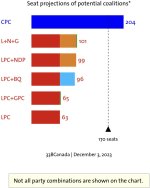
That’s because with 1.6% of the global total, Canada’s emissions are not enough to materially impact climate change, as the parliamentary budget officer has reported, along with the fact that when the negative impact on the Canadian economy of the federal carbon tax is factored in, most Canadian households paying it end up worse off financially, despite federal rebates that some Canadians might receive if they’re not single, or not above the poverty line (whatever that is), etc…
Mr. Trudeau, who was in the House of Commons on Friday morning, said “No, we’re not axing the tax” as he left the chamber with a smile.
In an effort to battle rising prices (like from the carbon taxes for example) and failing Liberal support in Atlantic Canada, the federal government is increasing the rebate on carbon pricing for rural Canadians and lifting the carbon price off of home heating oil entirely for the next three years.
The new rules would apply to the Prairie provinces (like the 0.3% of heating oil users in Saskatchewan), Ontario (where this is also a tiny %’age) and Atlantic Canada (where on average heating oil is used in about 33% of homes) to address affordability concerns, but have been largely criticized by climate groups.

Carbon tax pause on home heating oil will cost federal government $755M: PBO
While the temporary pause applies across the country, the new data show how the move clearly favours Atlantic Canada over elsewhere.
The government is not making a similar exemption for any other fuels used for heating like they did for heating oil predominantly used in Atlantic Canada, so people who use natural gas to heat their homes will still have to pay the carbon price.

The federal government has since rejected calls for more carbon-pricing concessions, saying its carveout aimed at improving the affordability of home heating oil won’t be extended to households who use other fuels to heat their homes like Natural Gas used predominantly across the nation outside of Atlantic Canada.
 There has been a significant backlash against the carbon tax in Atlantic Canada. Federal carbon pricing took effect on the East Coast in July. Since then, local MPs have received an earful about the higher costs. Opinion polling shows the Conservatives have gained a double-digit lead over the Liberals in the region.
There has been a significant backlash against the carbon tax in Atlantic Canada. Federal carbon pricing took effect on the East Coast in July. Since then, local MPs have received an earful about the higher costs. Opinion polling shows the Conservatives have gained a double-digit lead over the Liberals in the region.
What to know about Trudeau’s carbon-pricing system and the latest exemptions — The Globe and Mail
Ottawa is increasing the rural rebate on carbon pricing and introducing a three-year exemption on home heating oil, in a significant rollback to Prime Minister Justin Trudeau’s marquee climate policy
Canada adopted that position in the wake of Prime Minister Justin Trudeau causing a firestorm in 2017 when he said his climate change policies would eventually “phase out” Alberta’s oilsands, which went down about as well as you’d expect in Alberta.
In the face of that, the PM later said he “misspoke” and “said something the way I shouldn’t have said it.”
GOLDSTEIN: Meeting UN’s absurd emission targets would bankrupt Canada — Toronto Sun
Every major United Nations conference on climate change ends the same way – with absurd political hype over adopting meaningless catch phrases and setting imaginary goals that its 195 member nations will then fail to achieve. This year’s global gabfest in Dubai, located in an uber-wealthy...

However, they will, and are, rejecting federal policies that simply increase their cost of living with no demonstrable benefit to the environment.

That’s because with 1.6% of the global total, Canada’s emissions are not enough to materially impact climate change, as the parliamentary budget officer has reported, along with the fact that when the negative impact on the Canadian economy of the federal carbon tax is factored in, most Canadian households paying it end up worse off financially, despite federal rebates that some Canadians might receive if they’re not single, or not above the poverty line (whatever that is), etc…
Which vague Climate Group did you vote for?The new rules would apply to the Prairie provinces (like the 0.3% of heating oil users in Saskatchewan), Ontario (where this is also a tiny %’age) and Atlantic Canada (where on average heating oil is used in about 33% of homes) to address affordability concerns, but have been largely criticized by climate groups.

More Proof Bidenomics Doesn't Work
Enjoy the videos and music you love, upload original content, and share it all with friends, family, and the world on YouTube.
Trudeau likes to claim he’s “working to make life more affordable.” But he’s also hiking a tax that directly makes life more expensive — the carbon tax.
The carbon tax increases the price of gasoline, diesel and home heating fuels, which is a big deal in our vast, cold country. The carbon tax also makes groceries more expensive, as it increases costs for the farmers who grow our food and the truckers who deliver it.
The carbon tax will cost the average family up to $911 in 2024 even after the rebates, according to the Parliamentary Budget Officer….which many of us just don’t get and never have….good times.
TERRAZZANO: Trudeau planning to hike taxes again in the new year — Toronto Sun
Brace for impact, taxpayers. Prime Minister Justin Trudeau will be reaching deeper into your pockets in the new year with payroll tax hikes, a carbon tax hike and alcohol tax hikes. Canadians will be paying higher payroll taxes because of the mandatory rising Canada Pension Plan and Employment...
Beginning on Jan. 1, SaskEnergy and SaskPower will both remove the federal carbon tax cost from home heating.
The move is expected to save money for about 98 per cent of Saskatchewan families, according to a news release from the Government of Saskatchewan.
“Our government is ensuring fairness for Saskatchewan families by removing the federal carbon tax on natural gas and electric heat, just as the federal government has done for families in Atlantic Canada by removing the carbon tax on heating oil,” said Dustin Duncan, minister of Crown Investments Corporation.
SaskPower will eliminate the carbon tax on (electric) heating by reducing the federal carbon tax rate rider on their bills by 60 per cent — in accordance with heating accounting for 60 per cent of power consumptions during winter months for customers relying on electric heat.

 www.cjme.com
www.cjme.com
The move is expected to save money for about 98 per cent of Saskatchewan families, according to a news release from the Government of Saskatchewan.
“Our government is ensuring fairness for Saskatchewan families by removing the federal carbon tax on natural gas and electric heat, just as the federal government has done for families in Atlantic Canada by removing the carbon tax on heating oil,” said Dustin Duncan, minister of Crown Investments Corporation.
SaskPower will eliminate the carbon tax on (electric) heating by reducing the federal carbon tax rate rider on their bills by 60 per cent — in accordance with heating accounting for 60 per cent of power consumptions during winter months for customers relying on electric heat.

SaskEnergy, SaskPower offering carbon tax relief in 2024
Saskatchewan families can ring in the new year knowing they'll be saving hundreds of federal tax dollars in 20...
 www.cjme.com
www.cjme.com
Must be nice to live in a province where the government cares about taxpayers. BC government has never seen a tax they didn't like. Something like 23 new and improved taxes since the dippers seized power. FOr some reason that I do not understand, the low information voters think this is a good thing.
This comes from Manitoba. We hear it every day now – how unaffordable life is. Small businesses and farmers feel the pain of inflation and how impossible it is for families to put food on the table.Must be nice to live in a province where the government cares about taxpayers. BC government has never seen a tax they didn't like. Something like 23 new and improved taxes since the dippers seized power. FOr some reason that I do not understand, the low information voters think this is a good thing.
Brace yourself, more taxes are coming at the worst possible time. On April 1 (April Fools Day) the Liberal-NDP tax on carbon goes up from $65 a tonne to $80 a tonne, that’s a 23% increase! This hike can be the difference between putting food on the table and having to go to the bank to get a loan to stay afloat.
What was the point of the provincial NDP gas tax holiday if its only to be nullified or exceeded by the carbon tax hike? This is no time to be putting more pressure on struggling Manitobans, we must axe the Carbon Tax.
The Liberal-NDP government really only cares about their progressive ideology, they’ve lost tough with regular people. They don’t understand the impact this has on farmers and the families struggling to make ends meet.
Simply put, this is a tax on food, and it’s a significant reason that the cost of food has increased and stayed high.
It taxes the equipment that picks the food, transportation of the food, and everything else in between. The obscenity of it all culminates with a sales tax charged on the goods that have already paid the carbon tax. A tax on a tax on a tax…what is this madness?
KLEIN: Manitoba needs to work to axe the carbon tax — Winnipeg Sun
We hear it every day now – how unaffordable life is. Small businesses and farmers feel the pain of inflation and how impossible it is for families to put food on the table. Brace yourself, more taxes are coming at the worst possible time. On April 1 the Liberal-NDP tax on carbon goes up from $65...
What is our government’s solution? A one-time 3.3% rebate for an electrical vehicle which costs over $120,000. A vehicle that probably couldn’t make a run across the Prairies without discharging or breaking down, and that obviously the majority of us couldn’t afford. And the rebate is a drop in the bucket for people who are struggling to provide for their families and crippling taxes.